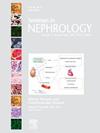Using Large Genomic Biobanks to Generate Insights into Genetic Kidney Disease
IF 3.5
3区 医学
Q2 UROLOGY & NEPHROLOGY
引用次数: 0
Abstract
Chronic kidney disease (CKD) affects approximately 9% of the global population, leading to increased risks of end-stage kidney disease (ESKD), cardiovascular disease (CVD), and mortality. Patients with CKD are a huge burden on health care resources globally. CKD is a complex condition influenced by a combination of genetic, environmental, and traditional risk factors. Family studies have suggested heritability rates for CKD ranging from 30% to 75%, and large genomic biobank studies have proven essential in identifying genes with substantial effects on CKD risk and in capturing cumulative genetic risk through polygenic risk scores. These biobanks are crucial for discovering new genes associated with kidney health and disease, and their growing size enhances the power to detect novel genetic associations. Integrating multi-omics technologies such as transcriptomics, metabolomics, and proteomics further enriches our understanding of CKD, while advanced computational tools continue to expand our insights into genetic data. Polygenic risk scores, derived from hundreds of genetic variants with small effect sizes, can help identify individuals at high risk of CKD. Genomic biobanks offer valuable opportunities for early identification and personalized treatment of monogenic kidney disorders, such as autosomal dominant polycystic kidney disease and Alport syndrome. These biobanks help fill knowledge gaps, particularly in individuals with milder or asymptomatic presentations who are often underrepresented in traditional studies. Expanding genomic biobank efforts globally, especially in diverse populations, is vital to enhancing our understanding of the genetic underpinnings of kidney disease. This review highlights the significant contributions of genomic biobanks to advancing our comprehension of the genetics of CKD.
利用大型基因组生物库来深入了解遗传性肾脏疾病。
慢性肾脏疾病(CKD)影响全球约9%的人口,导致终末期肾脏疾病(ESKD)、心血管疾病(CVD)和死亡率的风险增加。慢性肾病患者是全球卫生保健资源的巨大负担。CKD是一种复杂的疾病,受遗传、环境和传统危险因素的综合影响。家族研究表明CKD的遗传率从30%到75%不等,大型基因组生物库研究已被证明对于识别对CKD风险有重大影响的基因和通过多基因风险评分捕获累积遗传风险至关重要。这些生物库对于发现与肾脏健康和疾病相关的新基因至关重要,它们的规模不断扩大,增强了检测新遗传关联的能力。整合多组学技术,如转录组学、代谢组学和蛋白质组学,进一步丰富了我们对CKD的理解,而先进的计算工具继续扩展我们对遗传数据的见解。多基因风险评分来源于数百种具有小效应的遗传变异,可以帮助识别CKD高风险个体。基因组生物库为单基因肾病的早期识别和个性化治疗提供了宝贵的机会,如常染色体显性多囊肾病和阿尔波特综合征。这些生物库有助于填补知识空白,特别是那些在传统研究中往往代表性不足的症状较轻或无症状的个体。在全球范围内,特别是在不同人群中扩大基因组生物库的工作,对于增强我们对肾脏疾病遗传基础的理解至关重要。这篇综述强调了基因组生物库对促进我们对CKD遗传学的理解的重要贡献。Semin Nephrol 36:x-xx©20XX Elsevier Inc.。版权所有。
本文章由计算机程序翻译,如有差异,请以英文原文为准。
求助全文
约1分钟内获得全文
求助全文
来源期刊

Seminars in nephrology
医学-泌尿学与肾脏学
CiteScore
5.60
自引率
0.00%
发文量
27
审稿时长
6-12 weeks
期刊介绍:
Seminars in Nephrology is a timely source for the publication of new concepts and research findings relevant to the clinical practice of nephrology. Each issue is an organized compendium of practical information that serves as a lasting reference for nephrologists, internists and physicians in training.
 求助内容:
求助内容: 应助结果提醒方式:
应助结果提醒方式:


